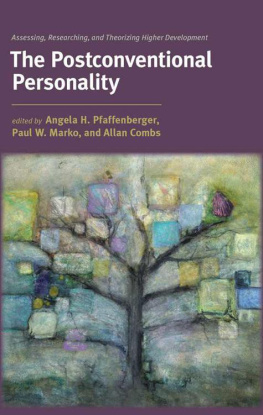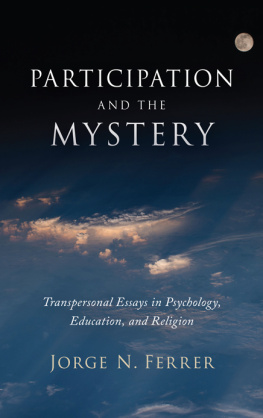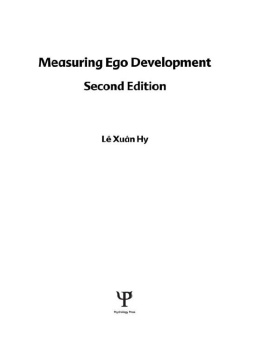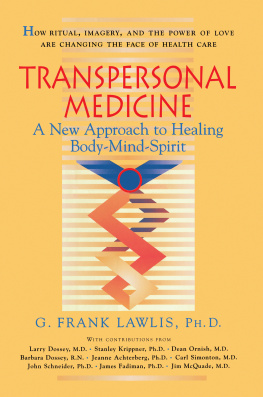SUNY series in Transpersonal and Humanistic Psychology

Richard D. Mann, editor
The Postconventional Personality
Assessing, Researching, and
Theorizing Higher Development
Edited by
Angela H. Pfaffenberger
Paul W. Marko
and
Allan Combs

Published by State University of New York Press, Albany
2011 State University of New York
All rights reserved
Printed in the United States of America
No part of this book may be used or reproduced in any manner whatsoever without written permission. No part of this book may be stored in a retrieval system or transmitted in any form or by any means including electronic, electrostatic, magnetic tape, mechanical, photocopying, recording, or otherwise without the prior permission in writing of the publisher.
For information, contact State University of New York Press, Albany, NY
www.sunypress.edu
Production by Diane Ganeles
Marketing by Anne M. Valentine
Library of Congress Cataloging-in-Publication Data
The postconventional personality : assessing, researching, and
theorizing higher development / edited by Angela H. Pfaffenberger,
Paul W. Marko, and Allan Combs.
p. cm. (SUNY series in transpersonal and humanistic psychology)
Includes bibliographical references and index.
ISBN 978-1-4384-3465-0 (hardcover : alk. paper)
ISBN 978-1-4384-3464-3 (pbk. : alk. paper)
1. Transpersonal psychology. I. Pfaffenberger, Angela H., 1957 II. Marko, Paul W., 1945 III. Combs, Allan, 1942
BF204.7.P67 2011
155.2'5dc22 2010025991
10 9 8 7 6 5 4 3 2 1
Contents
Angela H. Pfaffenberger and Paul W. Marko
PART I:
ASSESSING ADVANCED PERSONALITY DEVELOPMENT
Angela H. Pfaffenberger
Fred Travis and Sue Brown
Elaine Herdman Barker and William R. Torbert
Susanne R. Cook-Greuter
PART II:
EMERGING RESEARCH ABOUT
POSTCONVENTIONAL DEVELOPMENT
Tobias Krettenauer
Paul W. Marko
Jack J. Bauer
Heidi Page
Bill Joiner
PART III:
THEORIES OF ADVANCED DEVELOPMENT
Tracie L. Blumentritt
Laura King
Dennis Heaton
James Meredith Day
Allan Combs and Stanley Krippner
Judith Stevens-Long
Tables
Introduction

Exceptional Maturity of Personality
An Emerging Field
Angela H. Pfaffenberger
Paul W. Marko
In the third stage, the super-logical, the mind seeks to return to immediacy, to solve the dualism and oppositions inherent in the practical life of thought and action. One or another of the great ideals arises and becomes the place of retreat; and the universal categories of thought, the absolute forms of value, and the various panaceas of feeling erect their claims to final authority. [And so in the grand scheme] the leading motives of development [are seen passing] from perception and memory, through the various phases of the reasoning processes, and finding their consummation in the highest and most subtle of the super-logical, rational, and mystic states of mind.
This volume, although rooted in Jane Loevinger's work, goes beyond it in significant ways and presents a comprehensive examination of optimal adult development coming out of positive, developmental, and humanistic psychology. The introduction supplies the background and structure for a theory of the maturation of consciousness and introduces the reader to a rudimentary understanding of model for ego development. It represents the path that most chapters in this text are either explicitly based on or the underpinning from which their work is derived. Additionally, this chapter presents a background into what is known and theorized about how consciousness changes as it expands from one stage to another, and how this expansion appears as lived experience. It ends with an overview of the studies that appear in this volume and the book's overall significance for future research.
Developmental views in philosophy are at least as old as Friedrich Hegel's 1807 publication of The Phenomenology of the Spirit . James Mark Baldwin (18611934), one of American psychology's founding fathers was keenly aware of the importance of development for the human mind, but did not articulate a systematic theory of it. Since the mid-20th century, however, there has been a growing interest in individual maturation, or what many of the present authors term personal evolution. Especially in the second half of the 20th century, such developmental theorists such as ).
Until a few decades ago it was common to conceive of personal development as beginning at birth and proceeding in an orderly fashion through a sequence of developmental stages culminating in conventional adult functioning. The pioneering work of Jean Piaget (e.g., offered the most innovative and influential of the early neo-Piagetian theories, applying stage theory to the domains of moral reasoning and ego development, respectively.
defined an ego stage as a frame of reference or a filter that the individual uses to interpret life experiences. It implies a level of character development, cognitive complexity, an interpersonal style, and a set of conscious preoccupations. Loevinger developed a projective assessment instrument for measuring the level of ego development titled the Washington University Sentence Completion Test (SCT). The SCT translates qualitative observations about personality into quantitative data. Using this test, Loevinger laid the empirical foundation for hundreds of later investigations of adult development.
Loevinger conceptualized nine stages of personality development. The way the stages are named and numbered has changed over time, so the reader is cautioned that the same number may describe different stages in various research reports, and different names may describe the same stage. In this introduction we follow the latest version of the scoring manual ( estimate that about 10% of the adult population function at this level.
The following three stages are termed conventional . They describe about 80% of all adults in our culture. The fourth stage, Conformist , describes individuals who are identified with the values and norms of the social group to which they belong. They strive to express this through appearance and behavior, and are concerned about their reputation and possible disapproval from the group. In the eyes of the Conformist, good is what the group approves of. There is strong emphasis on outer, material aspects of life. A rigid black-and-white worldview in regard to what is acceptable in terms of gender roles and opinions predominates. Loevinger emphasized that members of nonconforming groups within the general culture, such as hippies or punks, often show and expect conforming behavior within their own groups.
Table 1.1. Correspondence of Ego Development Models
|
| Stage | Hy and Loevinger
1996 | Cook-Greuter
1999 | Torbert
2004 | Joiner
2007 |
|
| 2 | Impulsive | E 2 | Impulsive | Impulsive | Enthusiast |
| 3 | Self-protective | E 3 | Self-protective | Opportunist | Operator |
| 4 | Conformist | E 4 | Conformist | Diplomat |
Next page









